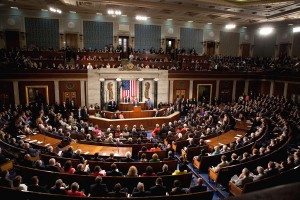 Every year, the American electoral process plays an increasing role in undermining the very system it was set up to sustain. There seems to be little doubt in the mind of the average American that Congress is not serving the needs of the general public particularly well. The role that well-heeled special interests play in the selection process has correctly been identified as a major factor in Congressional unresponsiveness to the public good.
Every year, the American electoral process plays an increasing role in undermining the very system it was set up to sustain. There seems to be little doubt in the mind of the average American that Congress is not serving the needs of the general public particularly well. The role that well-heeled special interests play in the selection process has correctly been identified as a major factor in Congressional unresponsiveness to the public good.
There is a widespread perception that a major overhaul of campaign financing would go a long way towards remedying the situation. I personally doubt that this is the case. For one thing, a good deal of so-called campaign finance legislation has already been enacted, to no avail. If anything, the workings of those laws that do exist have been perverse. This is perhaps not surprising, given that the task of reform is entrusted to a body that is acknowledged to be manipulated if not controlled by the very forces one is trying to counteract.
However, even the most well-crafted and comprehensive election financing laws will not alter the fact that an incumbent running for re-election is prevented from being an effective and conscientious legislator, more or less in proportion to the intensity of the impending contest. For one thing, the time and resources he or she must devote to campaigning inevitably detract from the business of running the country, or state, or other entity. In the case of the U.S. House of Representatives, nearly a year of a two-year term must be devoted to effort and strategies for re-election.
Crisis situations affecting large segments of the public, in which category our nation’s continuing economic woes must surely be numbered, encourage lengthy bitterly fought political contests – in other words, at precisely that point when one would wish legislators to devote as much attention as possible to the business of addressing grave problems, their attention is dissipated in preserving their seats so that at some future date they can bring whatever vision and expertise they have to bear. It has been suggested that in the case of an incompetent legislator or one who is entirely controlled by special interests this paralysis is actually a good thing – but that amounts to admitting that the system is irremediably nonfunctional.
In an election year, a legislator’s actual lawmaking must necessarily be heavily influenced by the way the public will perceive the actions on Election Day. This encourages support of bills with short-term favorable effects and long-term negative consequences. For example, borrowing money to fund pork-barrel projects that provide temporary employment but neither create permanent jobs nor contribute much to the nation’s infrastructure or enacting feel-good social legislation which leaves the task of funding programs to states and employers are ways to look good to constituents provided the consequences can be deferred past election day.
Are American elections too frequent? Insightful British commentators in the early 19th Century, comparing a system in which Parliamentary elections normally occurred every seven years but there was a provision for dissolving Parliament early, thought so. A system in which members of one entire legislative house must spend nearly half of their time gearing their actions toward the whims of a public whose decisions are based, for the most part, on sound bytes, is not one calculated towards intelligent long term planning, or one capable of making hard but necessary decisions that risk short-term unpopularity.
Following the same general line of reasoning, I consider that term limits are an open invitation to increase the influence of special interests and the power of money in our legislative bodies. Arbitrarily ousting an individual who has, presumably through serving the voting public pretty well, contrived to be re-elected repeatedly, and replacing him or her with an unknown whose fidelity campaign promises has yet to be determined, is not a strategy for encouraging independence and profound thinking. A business that adopted such a personnel management strategy would be shooting itself in the foot.
It is worth considering that we might have a cleaner elections process, and one that selected for more statesmanlike political leaders, if we made elections less frequent, especially for the U.S. House of Representatives.
Further Reading
Politics, Law and Policy Blog An Article concerning Georgia State legislature and views the lack of legislation in election years as a mixed bag.
Washington Post set of links on the debate over term limits.
Photo Credit:
Photo Is Public Domain


Please Share Your Thoughts - Leave A Comment!